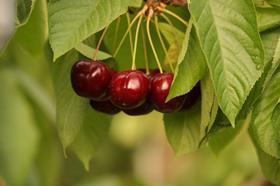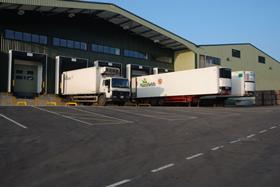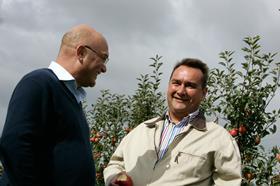


Staying at the top of your game and increasing your business year after year is not the easiest of tasks, especially when you’re a grower during a time of recession and intense weather volatility.
But the concept of battening down the hatches is simply not in the vernacular at Mansfields, the Kent top- and stonefruit grower that has been putting into place a dizzying array of new investments in the past year.
On an environmental front, Mansfields is carrying out a range of initiatives this year from bee hotels, reservoirs and wind turbines to bird surveys and a pollination study. That’s just the start of the on-farm spend: other moves aimed at reducing waste and increasing efficiency include the installation of three-row sprayers, irrigation monitoring, precision farming, pest and disease forecasting, yield prediction modelling and more. And by the end of this year Mansfields will increase its solar panel array from 150Kw to 1Mw of energy produced.
Indeed, finance director Philip Hermon says the company is investing £4-5 million per year on investing in improvements to the business. “Our growth plans over the next five years are fairly aggressive, but straight line,” he explains. “And we’ve got lots of young orchards that didn’t produce last year. For instance we’ve got 55 acres of cherries that we didn’t pick last year.”
Indeed, cherries form a key part of a new varietal mix that includes a focus on developing new varieties and bringing volumes of older-generation fruit like Cox “more in line with current consumer trends”. The company is also in a process of constant renewal of its orchards, emphasising newer fruit that is guaranteed to crop.
New for this year is an expansion into apricots, as well as further investment in DCA storage, store renewals, and grading and field-heat reduction technology. And that’s not to mention the fact the company always has one eye open for new farms.
“We’re very inquisitive on land, so when decent land comes along we do try and grab it if we can,” says Hermon. “Land prices are expensive at the moment, but most of our increase is just acquiring new land.”
Mansfields has come a long way in a relatively short period. Just 40 years ago, current owner Paul’s father began growing apples on a 20-acre smallholding in Kent, but that has morphed out of all recognition into today’s supply giant, which produces a wide range of top fruit, strawberries, cherries and plums on 3,500 acres across 20 farms in the south-east county.
Nowadays the company is a “much more corporate institution that is having to migrate and change and evolve”, according to business development manager Anthony Clark. Over the last four years the senior management team has seen the benefit of changes made, he explains, with a number of new faces entering the business. It is also supportive of new industry blood, with Clark himself having come through the respected MDS programme.
This investment in people is key, according to Hermon. “The people that were here almost 10 years ago, as they leave we are replacing them with better and more expensive people. It’s convincing this business to change, and it’s working. Everyone who’s leaving we’re replacing with the next model up. Yes, we’re a family business, but our customers expect us to be a multinational, corporate business, so it’s having that face. It’s a balance. They love the family, but they have the expectation of high administrative standards as well.”
An integrated business, Mansfields packs both its own and third-party produce, giving it a full sense of supply chain traceability. That undoubtedly helps at a time when food provenance is higher up the agenda than ever and costs are under particular scrutiny.
As for Paul Mansfield himself, it’s clear the man whose business carries his father’s name has lost none of the enthusiasm that has driven the company to new heights over the past decade. He talks proudly of the many projects and investments that are taking place, the company’s five-year rolling plan and the commitment to new top-fruit varieties such as Jazz, Envy, Smitten, Sweet Sensation and Taylor’s Gold.
“We are in control of our destiny,” he says. “What we want to do is grow quality British fruit. People want British, home-grown food. The business has grown with its own success, investment is continuous and everything we make is ploughed back in.”
Mansfield says he is “as enthusiastic as ever” for the business, but still has one eye on his succession plan, with 19-year-old son George – currently cutting his teeth at AG Thames – earmarked to take over in future.
And Mansfield is upbeat about the state of the British fruit industry too, arguing it is “much better placed” than 10 years ago, with growers having changed and adapted their businesses and switched to a varietal mix that is guaranteed to crop.
It all makes up for a pretty picture at one of the country’s most innovative growers. You get the sense that, while the nature of the business and vagaries of the environment mean there will never be more than cautious optimism, this is a company set up to be at the forefront of British production for a long time to come.



